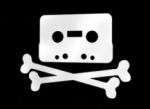Online music piracy has been an issue for well over a decade, but things have gotten much more interesting in the last few months. The shutdown of Megaupload was more or less the opening shot in the latest phase of the ongoing war over online piracy. Even before Kim Dotcom was carried away in handcuffs, things were already getting dramatic with the debate over SOPA and the widespread online protests that ultimately killed the bill as we knew it.

Given the police power used to detain Kim Dotcom and the DDoS attacks launched by Anonymous in retaliation, the whole affair started to feel more like an actual war last month. Call them The Piracy Wars.
The Megaupload case – and the many issues raised in its aftermath – is far from over. In the meantime, the Piracy Wars continue.
One of the latest targets of copyright holders is Grooveshark, the popular music streaming site that has long faced criticism for copyright infringement. The litigation brought against the company by all three major American music labels is still ongoing, but the site may be facing some ominous challenges in the meantime.

Grooveshark could soon be blocked by ISPs in Denmark, thanks to a ruling by a court in that country siding with copyright holders who say the company is responsible for copyright infringement and hasn’t done enough to stop it. The ruling comes just days after a music blog called RnBXclusive was shut down by U.K. authorities for hosting copyrighted material.
Grooveshark has been a thorn in the side of major music labels for quite some time. The company has long claimed that its protected by the Digital Milenium Copyright Act (DMCA), but the music industry insists that its activities go beyond what the DMCA permits. Evidence presented in Universal Music’s lawsuit against Grooveshark claims that company employees were complicit in the uploading of illegal material to the site, and were even rewarded for doing so. The company denies those claims.
The Pirate Bay could also find itself blocked in the U.K. after a judge ruled that the popular torrent site is complicit in copyright infringement.
In 2009, the founders of the Pirate Bay were found by a Swedish court to be guilty of violating copyright laws and sentenced to jail time. That sentence has since been upheld.
After the shutdown of Megaupload, several other cyberlockers and file-sharing sites either shut themselves down, scaled back operations or publicly proclaimed why they’re different from Megaupload in the hopes of avoiding a similar fate.

















